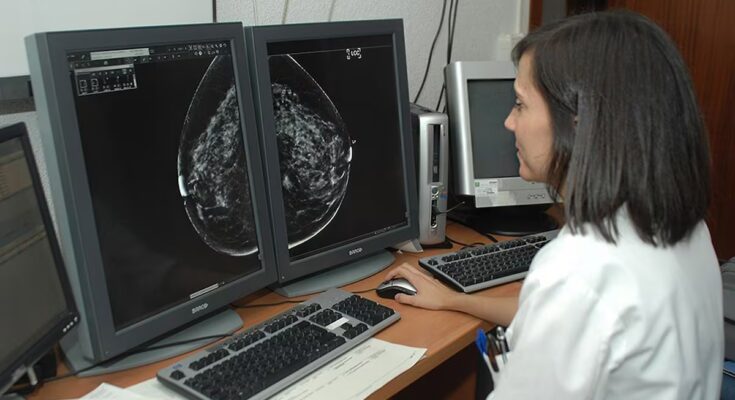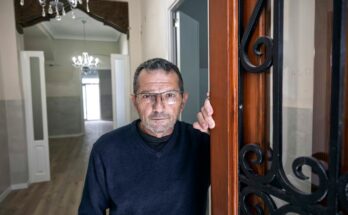The breast screening crisis in Andalusia has caused concern in some women, who perhaps at that moment did not give it more importance if the doctor did not give them any warning. But not everyone can go to the Internet to consult the contents of their tests. According to data collected by EL PAÍS, it is possible in nine of the 17 autonomous communities: Andalusia, Catalonia, Madrid, Galicia, Murcia (not in all hospitals), Valencian Community, Basque Country, Extremadura and Asturias. Castilla y León did not clarify this.
Information available at all times on a patient platform can be useful, but both the experts consulted and the majority of women’s breast cancer associations believe that it is not the most important thing. “The ideal is that the results are transmitted in person, contextualized,” says Gabriel Ródenas, of the Spanish Society of Clinical Psychology (ANPIR). Javier Serrano, head of Humanization of the Spanish Association against Cancer, thinks the same: “The information must be delivered personally to the patient, who has the right to ask questions and resolve doubts.”
This is generally the case, especially when there are negative results. In most communities, you will make an appointment with your doctor to tell him or her about the mammogram. In others, they receive a letter if there are no results and a call if they need to be repeated to confirm or exclude suspicions. This is exactly what did not happen in Andalusia, where more than 2,300 women did not know that their tests were doubtful.
In territories such as Aragon, Navarra, the Canary Islands, the Balearics, Castile-La Mancha, La Rioja and Cantabria, where a letter is sent if all goes well, the system is streamlined, but it also leaves out part of the process: women considered healthy are not summoned nor can they easily consult their tests, as the associations of women with breast cancer in these regions confirm. Many keep the letter confirming that “everything is fine” until the next call, a year or two later, without having direct access to the results.
In territories where digital platforms exist, women can consult their results at any time and, if they wish, also share them with other doctors. Raquel Cano, technical director and social work coordinator of the Oncology Association of Extremadura, explains that the organization is satisfied not only because they can access all the results, but because they believe it is essential that patients have an appointment with a doctor so that he can communicate it to them. In this community, all women must make an appointment with their family doctor to know the screening results, and then they can consult them in an application.
For Raquel the appointment is a guarantee, because she believes it is essential that a professional communicates the information. «The doctor can reassure the patient, explain the steps to follow and activate the protocol when necessary», he underlines. Also, remember that medical reports are full of technical language that can cause more anxiety than relief if you read them before going to your appointment. The waiting period is 30 to 45 days, which is adequate for you. “When there’s something suspicious, it can be shorter,” he says. After the visit to the doctor, patients can access the tests from the Jara application, print them and take them to other professionals if they prefer.
The women consulted, beyond the way in which the results are provided, what they appreciate most is the feeling that behind the whole process there are professionals who accompany their cases, instead of an automated system that manages their clinical situation. The Association for the Help of Women with Breast Cancer, in Cantabria, says that women receive a letter to attend an appointment with their family doctor, who informs them of the result (positive or negative) and, if necessary, refers them to a specialist. “The family doctor is an essential figure”, underlines the organization. However, direct access to testing is limited. These are only recorded in your history, which only the professional can access. If a patient wishes to consult their results, they can request them.
In Murcia, a significant proportion of women are referred to subsidized centres, where they cannot consult the results and, when there are no results, they only receive a letter with this information. Those treated in public hospitals have access to their reports through the patient portal. The board of directors of the Asociación Amiga de Murcia believes it is important that all women have access to images and the results of their tests, both in the public and private healthcare sectors. “They are our evidence, our images and we should be able to consult them as perfectly as any other evidence.”
The women who are part of the associations are, for the most part, those who have already undergone a diagnosis or closer medical follow-up. This is why they trust the system: because they know that there are professionals behind it. However, accompaniment, the human presence that gives security, is not yet guaranteed for everyone. And without easy access to results, many women could find themselves in a vulnerable situation.
“Publishing images does not inform”
In the case of Catalonia, the information is available online even before the visit to the doctor. This is not necessarily a good thing. “Directly publishing images or reports is not the same as informing. The patient cannot interpret for himself what a Birads 2 or a lesion on a mammogram means. He must talk to a healthcare professional,” says Serrano.
The expert insists that information circuits must be agile, but also human. “It is not possible to provide humanized assistance without clear and timely communication. It is urgent that autonomous communities establish rapid and effective circuits, but that they also take care of how communication is carried out,” he underlines.
“If they give you a report with technical details, without context or professionalism, that information is not managed or understood. If the result is ambiguous, the only thing it generates is uncertainty, and uncertainty makes the process more painful,” adds Ródenas.
The specialist reminds us that the right to information belongs to the patient, not to the doctor or the system. “Not giving information to avoid anxiety is a mistake: exactly the opposite happens,” he underlines. In his opinion, the communication of results must be part of a support process: “We must offer true information, adapted to the moment and to the patient. This type of news requires assimilation, a document or a letter is not enough.”
In an oncology trial, patients often forget how many cycles of chemotherapy they needed, the names of the drugs or the technical aspects of the treatments. What they always remember, says Serrano, who accompanied many of them, is the moment they told them the news that they had cancer.



